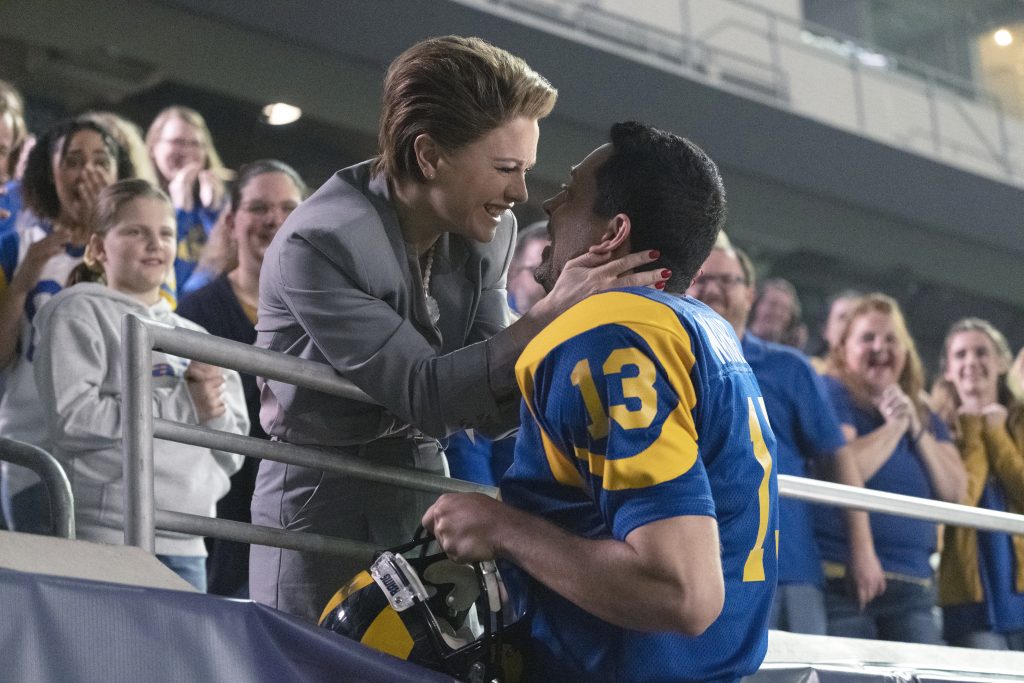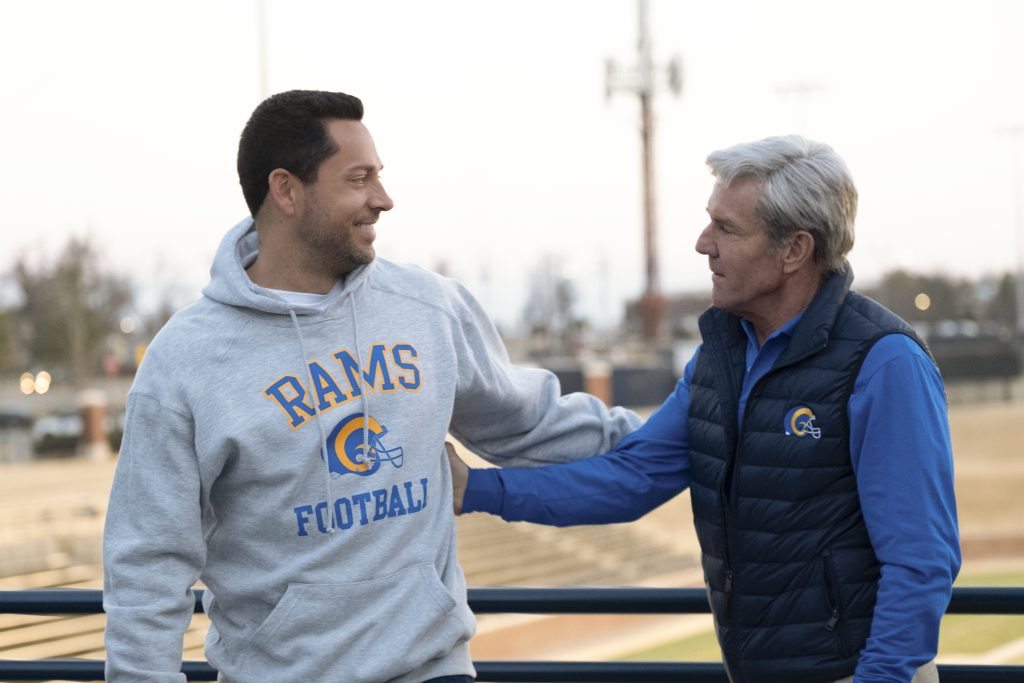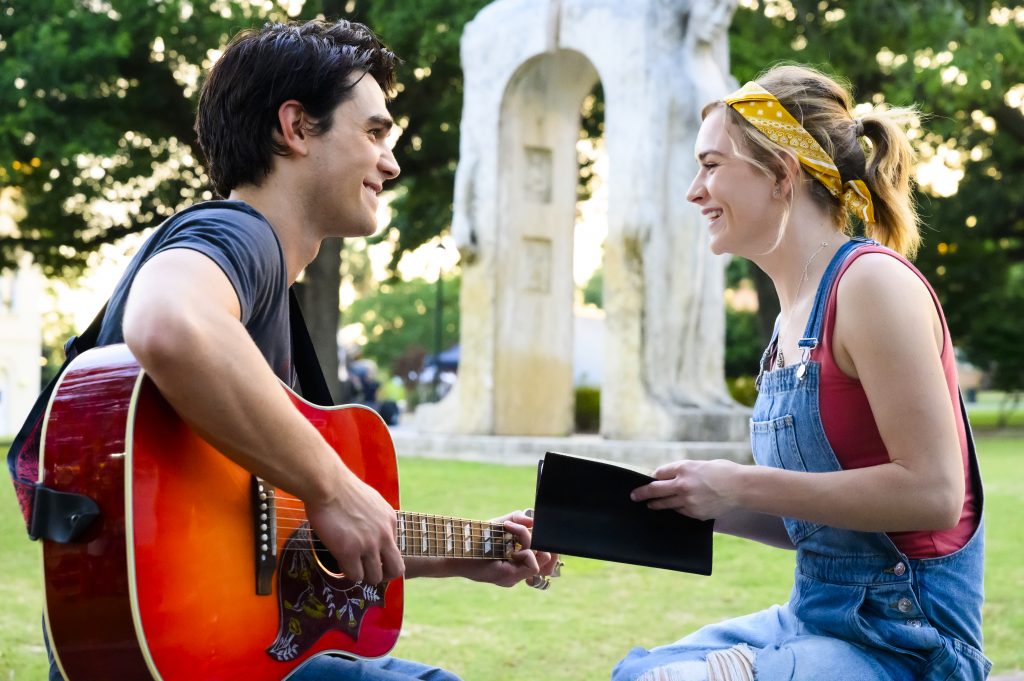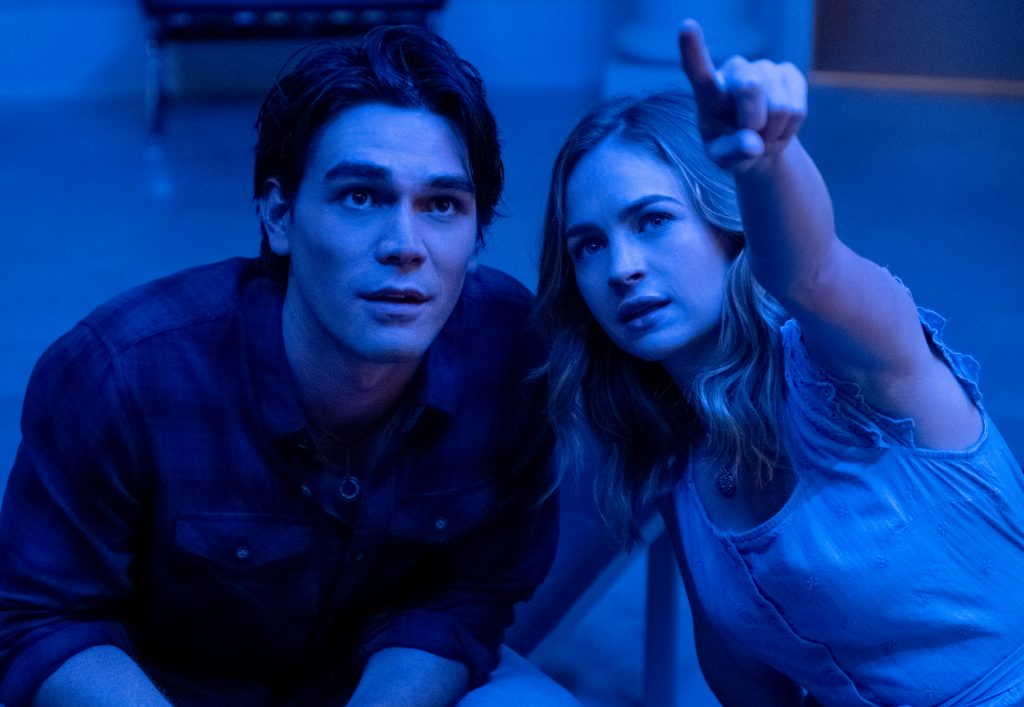December 17, 2021
by Carla Hay

Directed by Andrew Erwin and Jon Erwin
Culture Representation: Taking place from 1990 to 2000 in Iowa, Missouri, Wisconsin, Arkansas, and some other U.S. states, the dramatic biopic “American Underdog” features a predominantly white cast of characters (with a few African Americans) representing the working-class, middle-class and wealthy.
Culture Clash: After several years of trying to break into the National Football League (NFL) as a football player, Kurt Warner joins the St. Louis Rams, but he faces opposition and skepticism from people who think he’s too old and not good enough to play in the NFL.
Culture Audience: “American Underdog” will appeal primarily to people who are interested in American football movies and inspirational “against all odds” true stories.

Even though retired NFL player Kurt Warner’s life story is already known by many NFL fans, “American Underdog” is an entertaining version of his life on and off of the football field. The movie is entirely predictable but not too mawkish, thanks to grounded performances from Zachary Levi and Anna Paquin. With “American Underdog,” directors Andrew Erwin and Jon Erwin (the filmmaking brothers whose specialty is making faith-based Christian movies) tone down a lot of the religious preachiness that can be found in many of their other films. In fact, it’s pretty obvious in the movie that the biggest thing that Warner really worships is American football.
“American Underdog” (which was written by Jon Erwin, David Aaron Cohen and Jon Gunn) is not a completely comprehensive biopic, because it covers Warner’s life only from 1990 to 2000. He was with the St. Louis Rams from 1998 to 2003. Warner would later go on to play for the New York Giants (in 2004) and the St. Louis Cardinals, from 2005 to 2009.
“American Underdog” chronicles Warner’s life journey from his days on the football team at the University of Northern Iowa to his wannabe NFL player struggles to the first few years of his stint with the Rams. The movie accelerates and compresses Warner’s first three years with the Rams to make it look like he was on the team for a very short time before he played a life-changing game in 1999. (Most NFL fans already know what that game is.)
Up until that game-changing moment, the movie focuses on how Kurt Warner (played by Zachary Levi) was underestimated or dismissed for most of his football career. A great deal of the movie also shows the ups and downs in his personal life, including an on-again/off-again romance with Brenda Meoni (played by Anna Paquin), who was a divorced mother of two underage children when they first met while he was a student and a star football quarterback at the University of Northern Iowa. This romance, even when it was at its most painful and distant, would turn out to be the one constant in the couple’s lives when experiencing life lessons about love, loyalty and not giving up on dreams.
“American Underdog” has a straightforward narrative told in chronological order. (There are few brief flashback scenes showing Kurt as a child, played by Beau Hart.) The first third of the movie depicts Kurt’s life when he was a college student and his first few years out of college. Therefore, it’s a bit of stretch to see Levi and Paquin (who were in their late 30s/early 40s when they filmed this movie) portraying people who were supposed to be in their early-to-mid-20s. (The real-life Kurt and Brenda had consulting roles for “American Underdog” and visited the film set.)
One of the better aspects of “American Underdog” is how it doesn’t portray Kurt and Brenda’s romance in a fairytale way. Brenda (who’s four years older than Kurt) played very hard-to-get in the beginning—not in a coy way, but in a way that was a reflection of who she was at the time: a financially struggling divorcée with trust issues because her ex-husband cheated on her. In the beginning of their relationship, Brenda was emotionally aloof and outright insistent to Kurt that they wouldn’t make a good couple because she said she didn’t like sports. (Obviously, she changed her mind later.)
Kurt, as portrayed in this movie, wasn’t exactly a dashing and suave Romeo. In many ways, his courtship of Brenda could be considered aggressive and even stalkerish. When they first meet at a bar playing country music, Kurt can’t take his eyes off of Brenda. He’s instantly smitten, and she’s not. Brenda loves line dancing to country music. Kurt not only dislikes country music, but he also doesn’t know how to line dance.
However, that doesn’t stop Kurt from making his first move on Brenda. Kurt literally muscles his way in on her dance partner, by nudging the other man and telling him (in a polite manner) to get out of the way. During this first dance together, Kurt introduces himself, but Brenda is so wary that she won’t even tell Kurt what her name is. It becomes an awkward joke for the rest of the evening when she still won’t tell Kurt her name.
Their first conversation also reveals how different their lives are. Kurt came from a family where his parents split up when his father abandoned the family. Kurt’s mother Sue Warner raised Kurt and his brother as a financially struggling divorced parent. Kurt tells Brenda, “Football was the most important thing my pops taught me before he left.” Kurt adds that he has reconciled with his father, “who’s back in my life now,” but there are still some emotional difficulties in this father/son relationship.
Brenda tells Kurt, “I hate sports, so it’ll never work between us.” She tells him up front that she’s divorced with two kids. And she’s certain that this information will scare off this young bachelor college student. “If I never see you again, I’ll totally understand,” Brenda says when she tells him that she’s a single mother. Brenda’s messy personal life is in contrast to that of her parents, who are still happily married after decades together.
What Brenda doesn’t tell Kurt during their first meeting is that she and her two children are currently living with her parents because Brenda is unemployed and can’t afford to have her own place. Kurt finds out when he shows up unannounced and uninvited at the house to see Brenda and meet her children. Brenda is naturally shocked to see him. Kurt tells Brenda that he found out where she lived by asking the bartender at the bar where Kurt and Brenda met.
It’s a stalker move, but it’s supposed to show that Kurt was willing to go to certain lengths to court Brenda. Not only that, but Kurt also walked the three or four miles to get to the house because he didn’t have a car at the time. Brenda doesn’t want invite him into the house, but her son Zack (played by Hayden Zaller), who’s about 7 or 8 years old, lets Kurt into the house.
Kurt and Zack have an almost immediate bond. Zack tells him that his transistor radio in the bathroom doesn’t work, and Kurt sees that all the radio needs is a second battery. Kurt and Zack then lie down on the bathroom floor to listen to the radio. Zack happens to be legally blind, but Kurt treats him like would treat any other kid. Brenda’s other child is a daughter named Jessie, who’s about 2 or 3 years old.
Brenda starts to warm up a little to Kurt when she sees how kind he is to Zack. Eventually, Brenda opens up to Kurt when she tells him a little more about her background: She used to be in the U.S. Marines and thought that she would have a perfect Marine life, including the Marine man she married named Brad, who is not seen in the movie. But Brad cheated on her when she was pregnant with Jessie.
Brad also caused Zack’s blindness: When Zack was four months old, Brad accidentally dropped Zack on the head when Brad was alone taking care of the Zack. However, when Zack was taken to the hospital with a swollen head, Brad didn’t immediately tell anyone that the reason for the swollen head was because her dropped Zack.
Brad didn’t disclose this crucial information until more than a day after Zack was taken to the hospital. But by then, it was too late, and Zack lost most of his eyesight because of the brain damage. Doctors had predicted that Zack would never be able to sit up or walk on his own. Zack defied those predictions and had the ability to do those things as a child.
At the time Kurt and Brenda met, she had left the Marines and was studying to be a nurse. Because she has to take care of two young kids, Brenda warns Kurt that she won’t be able to spontaneously go out on dates because her kids will be her top priority. It doesn’t deter Kurt. Although some people might think that Kurt and Brenda’s “meet cute” was fabricated for a movie, how they met and how Kurt followed up really did happen this way, according to interviews that Kurt and Brenda have given.
When she finally agrees to go on a date with him, he’s gotten a truck, and the kids go with them. It’s a simple date—Kurt and Brenda just hang out at a lake and talk while the kids sleep in the back of the truck—but it’s enough to spark a romance. When Kurt takes them back to the house, and he and Brenda spend some time alone, she again tells him that their relationship won’t work. But then she practically jumps on him to kiss him, and Kurt enthusiastically kisses her too.
Over time, Brenda’s parents Jenny Jo (played by Morgana Shaw) and Larry (played by Danny Vinson) are more accepting of Kurt than Kurt’s mother Sue (played by Cindy Hogan) is accepting of Brenda. Sue is afraid that Brenda being an unemployed single mother will be too much of a burden for Kurt, because Sue went through similar struggles. Brenda tells Kurt that most mothers of men she’s dated have had similar reactions to Brenda. As the movie goes on, it shows how much Kurt and Brenda are each other’s biggest support during the lowest points in their lives.
Kurt’s NFL dreams seemed to be on track when he was recruited by the Green Bay Packers not long after graduating from college. However, those dreams got a serious setback when he was cut from the Packers after less than two days. The reason? The team’s quarterback coach Steve “Mooch” Mariucci (played by Brett Varvel) didn’t think Kurt was prepared to play in the NFL.
The turnoff for Mooch was that when Mooch asked Kurt to go on the field during practice, Kurt didn’t want to go on the field because Kurt said he didn’t know the playbook yet. As far as Mooch was concerned, Kurt should’ve been eager and ready to know the playbook on the first day of practice. Kurt’s hesitancy cost him a place on the team.
It was a painful rejection that led to years of struggle for Kurt, who never gave up on his dream to play professional football. During those lean years, he experienced unemployment and a lot of financial problems, including being temporarily homeless. At one point, the only job he could find was being a shelf stocker at a Hy-Vee grocery store in Cedar Falls, Iowa, where he had to face people who knew him as a once-promising college football star. Eventually, Brenda invited Kurt to live with her and her parents because Kurt had nowhere else to live.
“American Underdog” has moments where these struggles are depicted in very dramatic and very “in your face” ways—literally. There’s a scene where Kurt is stocking shelves at the grocery store, and he sees a Wheaties box with Miami Dolphins star Dan Marino on the cover. Kurt looks at the box with a sad expression on his face that says, “That could’ve been me. I should have the life that Dan Marino is having.”
In another scene, Kurt and Brenda are so financially broke, they can barely afford gas for their car. And sure enough, they run out of gas, with the kids in the back of the car, on a deserted road. And wouldn’t you know: It’s during a blizzard. And so, Kurt has to walk to the nearest gas station, which is about four or five miles away, all the while hoping that Brenda and the kids won’t freeze to death or get frostbite in the car.
After this “stranded during a blizzard” incident, Kurt realizes that he can’t continue to be financially unstable, and he has to be a better provider for Brenda and the kids. And so, Kurt does something that he vowed that he would never do: Say yes to an offer from Iowa Barnstormers chief Jim Foster (played by Bruce McGill) to play for the Barnstormers in the Arena Football League, which Kurt says is “for guys who are circling the drain.”
Kurt signs on to play for the Iowa Barnstormers, which he gripes is “all the way in Des Moines, and it’s not even real football.” However, bills must be paid, and Brenda is supportive because she knows playing professional football is what Kurt really wants to do with his life, even if it’s for a team that Kurt thinks is a pathetic joke. Luckily for Kurt, his college best friend Mike Hudnutt (played by Ser’Darius Blain) is also on the Barnstormers team.
Just like during his college football days, Kurt also becomes a star quarterback for the Barnstormers. What Kurt and Brenda don’t anticipate in advance his how much Kurt ends up enjoying the partying that comes with being a football star. His constant traveling also takes a toll on their relationship. Brenda then goes through a tragedy that also tests the love that she and Kurt have for each other.
Brenda is a religious Christian, while Kurt was not particularly religious when he first met Brenda. Over time, Kurt became a more devout Christian. And although “American Underdog” could be considered a faith-based movie, this is not a typical Christian faith-based movie where God or Jesus is mentioned every 10 minutes. There are scenes of people praying, but there aren’t scenes of people going to church on a regular basis. There’s one big church scene, and it’s exactly what you think it is, considering that it’s easy to predict or know what happened to Kurt and Brenda’s courtship.
As Kurt, Levi has somewhat of a passing physical resemblance to the real Warner, and he capably handles all the football scenes, which include several real-life current and former pro football players. Levi is known to appear in mostly comedic projects or in dramas where he’s a wisecracking comedic character, so “American Underdog” is a real departure for him as an actor. He’s an easy protagonist to root for, but the movie also shows how a single-minded persistence to follow a career dream always comes at some price to someone’s personal life.
Paquin also makes her character command the screen with a believability. Brenda is both strong and vulnerable as someone who knows what it’s like to have broken dreams but has enough love in her heart to encourage Kurt to follow his football dreams, even if it means Kurt has to sacrifice time that he could be spending with her and the children. Yes, there are thrilling football scenes, but the movie’s heart is really in the relationship between Kurt and Brenda. It’s a reminder that anyone who achieves fame and fortune through a career always had supportive people along the way who helped with those achievements.
As for the supporting cast members, Dennis Quaid shows up in the last third of the movie as Rams head coach Dick Vermeil, the person on the team who believed in Kurt the most, even when numerous people—including Rams offensive coordinator Mike Martz (played by Chance Kelly)—told this coach that he was making a mistake in supporting Kurt. Mike was one of the naysayers until Kurt proved him wrong. Quaid plays the role in a standard way that still manages to convey some individual personality. Zaller (who is legally blind in real life) is a scene stealer as Zack. He’s not an extremely polished actor, but child actors don’t get much more adorable than Zaller in this movie.
“American Underdog” mostly succeeds in its obvious aim to be a heartwarming and inspirational movie. It’s not pretending to be artsy or subtle. And the movie isn’t going to be winning any prestigious awards. But for audiences who want to see a drama about “ordinary” people who can do “extraordinary” things with persistence and the right support system, then “American Underdog” delivers on those expectations. The movie does a good job in conveying the message that people’s true characters are made during their most difficult times.
Lionsgate will release “American Underdog” in U.S. cinemas on December 25, 2021. The movie is set for release on digital on February 4, 2022, and on Blu-ray, DVD, 4K Ultra HD and VOD on February 22, 2022.


